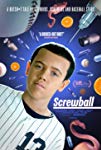Eye For Film >> Movies >> Screwball (2018) Film Review
Screwball
Reviewed by: Jennie Kermode

If there's one thing that cinema routinely gets wrong about organised crime, it's portraying it as professional. Yes, there are professional, polished and highly skilled gangsters out there but they're in a minority, especially in the US, where a crisis of succession led to the Italian Mafia losing a lot of its territory in the early part of this century so that minor gangs and outright amateurs moved into the spaces that were left. In the cinema, criminals might wear well tailored suits, run casinos and push cocaine, but in real life, in Florida, they wear ill-fitting shirts, run tanning salons and push steroids and anti-ageing treatments.
There's a pettiness about the would be tough guys in Billy Corben's documentary that highlights the essential absurdity in trying to organise people who are all out for themselves. The multiple betrayals and backstabbings (all metaphorical) that take place as the saga unfolds give it the character of a screwball comedy, hence the title. At the heart of it all is Anthony Bosch, an unlicensed physician (his term) with a dubious foreign medical degree and a lot of retired doctors wiling to sign off on prescriptions for him in exchange for cash. It started, according to his version of events, with the simple provision of advice about steroid use for bodybuilders, but before long Bosch was directly supplying the drugs in a carefully planned microdose regime that allowed athletes to enhance their muscles whilst remaining under the radar of sports drug test regimes.

There were big names involved in this, like baseball players Alex 'A-Rod' Rodriguez and Manny Ramirez, something that would result in a national scandal and, along the way, prompted a comically clumsy investigation by sporting authority employees with pretension to being the FBI - parts of this film might easily be repackaged into a handy guide to what not to do when negotiating with criminals. Though much of this is played for laughs, the film ends with a reflection on what it meant to baseball fans to lose their heroes, a reminder of why corruption in sport matters (and how much of it is still going on). There's also a disturbing secondary aspect to Bosch's practice: the provision of steroids to schoolchildren to let them get ahead in school sports. The focus here, however, is on the destruction of childhood innocence, with no real mention of the developmental risks involved with steroid use at that age.
Children come into the film in another way: as performers, dressing up and miming along to the words spoken by the various players. On the one hand, this further highlights the ridiculous nature of the rivalries and investigations that grew up around Bosch's work; on the other, there could be a serious aspect to it - actors playing real life gangsters in other states have been known to receive death threats and children are considerably safer. This could have been an excruciating gimmick but the young actors are all very good and do an impressive job of adopting poses and acting out clichés which themselves do as much to satirise cinema as to comment of the Florida scandals. There's a cute out-takes reel over the closing credits in which we get to see them slip out of character.
This is a film that will mean a lot more if you'e a fan of baseball or aficionado of the recent trend for sharing tales of low quality Floridian crimes. It doesn't translate particularly well beyond that and it isn't always as funny as it thinks it is, but it's watchable enough and has a lot of story to tell. And if you have a youngster who's attracted to the supposed glamour of a criminal lifestyle, it provides a salutary lesson.
Reviewed on: 03 Apr 2019















